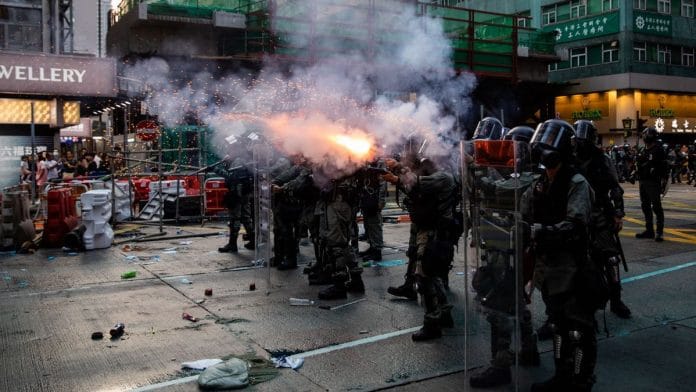Hong Kong/New York: The national security law that China could impose on Hong Kong as early as this week won’t need to be used if the financial hub’s residents avoid crossing certain “red lines,” according to a top adviser to Hong Kong Chief Executive Carrie Lam.
“It really is to warn people: Do not cross those red lines, you cannot ask for Hong Kong independence and we do not tolerate terrorist acts like what happened last year during the social unrest,” Bernard Chan, a convener of Hong Kong’s advisory Executive Council, said in an interview with Bloomberg Television on Monday.
“As long as people abide by the law, I suppose we never have to use this piece of legislation,” said Chan, who is also one of Hong Kong’s deputies to the National People’s Congress, which is drafting the law.
Chan, who hasn’t seen a draft of the law, said it will not be retrospective and that Hong Kong’s foreign judges will still be able to rule on sensitive cases. Any U.S. sanctions issued in response to the new law would be “lose-lose,” he said.
Chinese lawmakers are meeting in Beijing to discuss the national security legislation, which would bar subversion, secession, terrorism and collusion with foreign forces in the former British colony. A vote could come Tuesday morning, the day before the anniversary of the city’s handover to China in 1997, Now TV News reported.
Also read:How China is tightening its grip on Hong Kong’s economy
Potential protests
China’s surprise announcement in late May that it was moving to bypass the local legislature and force security legislation on the city has prompted a resurgence of protests that rocked the financial hub last year but had mostly dissipated amid the coronavirus pandemic.
Hong Kong police said Sunday they had arrested 53 citizens for unlawful assembly during a rally against the law in the crowded Mong Kok neighborhood on the Kowloon side of the city’s harbor.
One of the main organizers of Hong Kong’s huge protest marches last year, the Civil Human Rights Front, has been denied police permission for a large rally on July 1. The day is traditionally marked by protests in the semi-autonomous city and will be particularly sensitive this year with the likely passing of the security law. The group has said it will appeal the police rejection, and it’s possible that protesters will gather regardless.
Hong Kong has loosened virus-related social distancing restrictions in recent weeks, but has continued to withhold permission for protests.
Fresh details
With even Chan and Hong Kong’s leader acknowledging they haven’t seen a copy of the law, many in Hong Kong have been reliant on details emerging from meetings of the NPC’s Standing Committee, China’s top legislative body.
Those senior Chinese officials began discussing the law at a three-day meeting that started on Sunday, after a meeting last weekend also revealed new details for the first time — including that the security law would override Hong Kong’s local laws.
The proposed law will have a life sentence for convictions on secession and subversion charges, Now TV reported this weekend, citing unidentified people. Radio Television Hong Kong had previously reported that sentences would range between three and 10 years and would be largely in line with Hong Kong’s criminal laws.- Bloomberg
Also read:Pentagon names 20 ‘Communist Chinese military companies’ operating in US, sanctions likely






